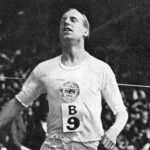Going Past the Gold
Several friends and I watched Chariots of Fire, a movie about the 1924 Paris Olympics. I found myself caught up in the character of Eric Liddell. Liddell, an Edinburgh University runner, was headed for a post as a missionary in China. In the Olympics, he refused to run in the 100 meter sprint, in which he was Britain’s greatest hope for the gold. Why? Because the 100 meter trial heats were held on Sunday, and Liddell was a Christian.
Eric Liddell
1902 – 1945
Liddell refused to run in the 100 meter sprint, in which he was Britain’s greatest hope for the gold. Why? Because the trial heats were held on Sunday, and Liddell declined to dishonor God by breaking the Sabbath, though the British Olympic committee and much of the press attacked him for his stand.
Going Past the Gold
During the Olympics this summer, several friends and I watched Chariots of Fire, a movie about the 1924 Paris Olympics. I found myself caught up in the character of Eric Liddell. Liddell, an Edinburgh University runner, was headed for a post as a missionary in China.
In the Olympics, he refused to run in the 100 meter sprint, in which he was Britain’s greatest hope for the gold. Why? Because the 100 meter trial heats were held on Sunday, and Liddell was a Christian. He declined to violate his conscience and dishonor God by breaking the Sabbath, though the British Olympic committee and much of the press attacked him for his stand.
Having given up his chance for glory in the 100 meters, Liddell ran as a relative novice in the 400 meters instead, in stifling heat, and in the outside lane. He ran flat out from the gun, and surprised everyone by winning in world record time, five meters ahead of his closest rival. But what Liddell did at the 1924 Olympics—break a world record—is not so important as what he didn’t do—violate his conscience.

Liddell ran as a relative novice in the 400 meters and surprised everyone by winning in world record time, five meters ahead of his closest rival. But what Liddell did at the 1924 Olympics is not as important as what he didn’t do—violate his conscience.
Some say each man has his price—why not go against your principles if there is gain at stake? And surely, if all we had as Christians were personal convictions, there might be something to that argument. But Eric Liddell knew that God had committed to his keeping a treasure greater than any set of convictions. The Bible says:
“For God, who commanded the light to shine out of darkness, hath shined in our hearts, to give the knowledge of the glory to God in the face of Jesus Christ.
“But we have this treasure in earthen vessels, that the excellency of the power may be of God, and not of us.” (2 Corinthians 4)
We have treasure in earthen vessels—that is, as Christians we carry the knowledge of God and the life of God, around with us in our bodies. If we set ourselves apart for God, what pours out is not just the life of the jar, the old human vessel, but the life of Jesus.
Eric Liddell’s life radiated his peacefulness, what the world sometimes calls serenity. Free of the sour or selfish ambition that often plagues athletes, he ran with the joy and abandon known only to a man with a clear conscience. By his widow’s testimony, he had run with even more joyous unrestraint than Chariots of Fire suggests. The treasure he had, the life of Jesus within, was visible even in his running, because he would not sacrifice his God for success, “a shot at the gold.” It wasn’t that he himself was special, but that Eric Liddell knew how to keep and cherish God’s treasure.
If you know Christ, will you guard God’s deposit in you, and not sell yourself for lesser things? Will you let Jesus’ beauty shine through you unobstructed? Will you set your life apart for God as Christ set his life apart for you?
Marena Fisher, Graduate ‘91

